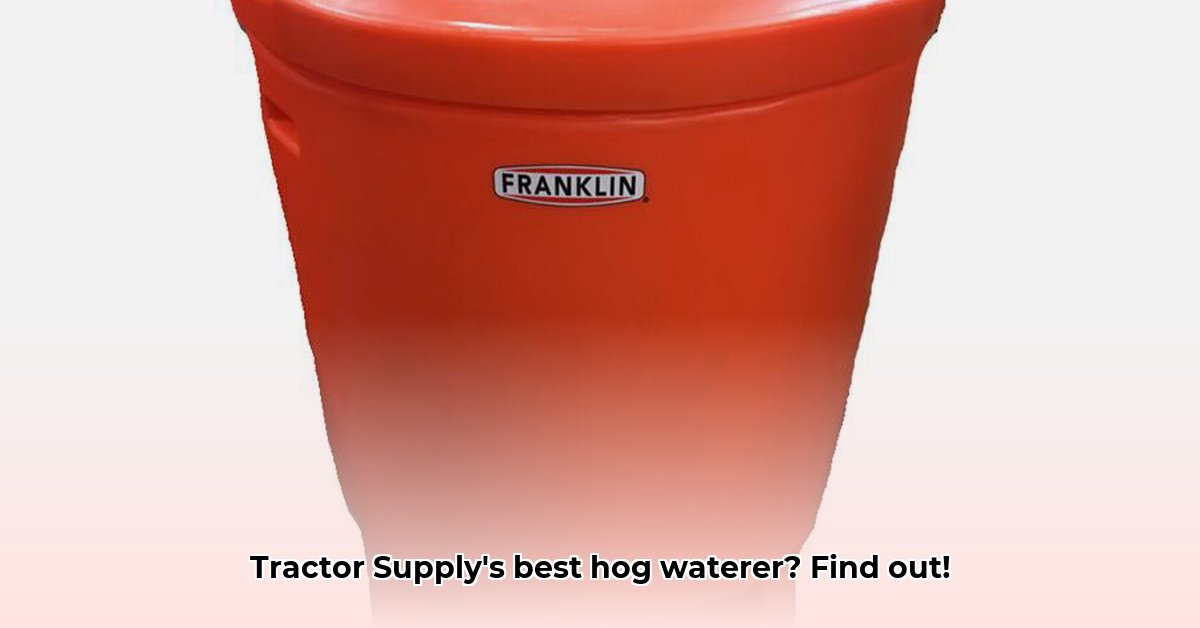
Selecting the Right Hog Waterer: A Comprehensive Guide
Choosing the optimal hog watering system is paramount for both animal welfare and sustainable agricultural practices. This guide provides a step-by-step approach to selecting, installing, and maintaining hog waterers from Tractor Supply, focusing on water conservation and efficient farm management. We'll explore different types of waterers, analyze their pros and cons, and offer practical advice to help you make an informed decision. For larger-scale operations, consider exploring additional tank options like those found at Tractor Supply fuel tanks.
Understanding Your Farm's Water Needs
Before embarking on your search, assess your specific requirements. Consider the following:
Herd Size: The number of pigs directly influences the waterer's capacity and type. A small-scale operation might suffice with a simple gravity-fed system, while larger farms need higher-capacity options. How many hogs are you currently housing, and how is that number expected to change in the next few years?
Budget: Waterers range in price from simple, inexpensive models to complex, automated systems. Establish a realistic budget that considers both initial investment and long-term maintenance costs, including potential repairs or replacements. What is your allocated budget for new watering systems, and how much can you comfortably spend on maintenance each year?
Farm Layout & Water Source: Evaluate the proximity of your water supply and its accessibility. This influences the type of waterer you can effectively install and maintain. Is your water source centrally located, or will you need to transport water to the hogs?
Climate: Extreme temperatures can impact waterer functionality. In freezing climates, you might need waterers designed to prevent freezing, while in hot climates, you might prioritize options that minimize water warming. What is the average temperature range throughout the year in your region?
These factors are critical in selecting a waterer that doesn't just meet your current needs, but is also prepared for future growth and environmental conditions.
Tractor Supply Hog Waterer Options: A Comparison
Tractor Supply offers several types of hog waterers, each with distinct advantages and disadvantages:
Gravity-Fed Waterers: These are the simplest and least expensive options. Water flows passively from a reservoir into a trough. They are easy to maintain, but prone to spillage, contamination, and require consistent water replenishment. They are best suited for smaller herds and simpler farming setups. How much time do you dedicate to routine checks and maintenance?
Nipple Waterers: These systems deliver water through individual nipples activated by the pigs. This design reduces spillage, contamination, and more accurately measures water consumption. While they require a more involved installation, the benefits in hygiene, water conservation, and reduced labor costs often outweigh the initial investment for all herd sizes. What are your farm's hygiene standards?
Trough Waterers: These are large, open troughs, offering easy access for many pigs. However, they are susceptible to significant water wastage and contamination. Regular cleaning is essential to maintain hygiene. How much water loss per day can you realistically tolerate?
Automatic Waterers: These sophisticated systems maintain a consistent water level through automated refilling mechanisms, often using electricity. They are the most expensive option but offer substantial labor savings, water conservation, and consistent water provision. They are best suited for large-scale operations. What is your farm's energy efficiency commitment?
The table below provides a concise comparison:
| Waterer Type | Initial Cost | Maintenance | Water Efficiency | Hygiene | Labor | Best Suited For |
|---|---|---|---|---|---|---|
| Gravity-fed | Low | Low | Low | Low | High | Small herds |
| Nipple | Moderate | Moderate | High | High | Low | All herd sizes |
| Trough | Low | High | Low | Low | High | Large herds |
| Automatic | High | Moderate | High | High | Low | Large-scale farms |
Step-by-Step Guide to Choosing the Right Waterer
Assess Your Needs: Carefully consider herd size, budget, farm layout, climate, and long-term goals.
Compare Waterer Types: Use the information above and carefully weigh the pros and cons of each type.
Research Tractor Supply Options: Examine the specific models offered by Tractor Supply, comparing features, warranties, and customer reviews. Are there specific models that address your climate conditions?
Calculate Total Cost of Ownership: Factor in initial costs, maintenance, repairs, and replacement to ensure long-term financial viability.
Make Your Decision: Select the waterer that best aligns with your requirements and budget.
Installation, Maintenance, and Sustainability
Proper installation is crucial to prevent leaks and ensure efficient operation. Follow the manufacturer's instructions meticulously. Regular cleaning and maintenance prevent the growth of harmful bacteria and prolong the waterer's lifespan. This is critical for maintaining both animal health and the overall sustainability of your farming practices. How frequently will you inspect the water system for leaks or other issues?
Selecting an efficient and durable waterer is a vital step toward sustainable farming. Minimizing water wastage not only reduces your environmental impact but also lowers operating costs. Prioritizing water conservation contributes to both the financial and environmental health of your farm.
By following this guide, you can select the best hog waterer from Tractor Supply that meets your specific needs and upholds the highest standards of animal welfare and sustainable agricultural practices.